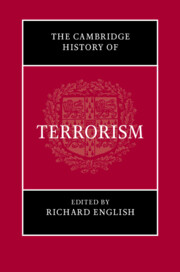40 results
Part IV - Thematic Essays
-
- Book:
- The Cambridge History of Terrorism
- Published online:
- 07 May 2021
- Print publication:
- 20 May 2021, pp 501-644
-
- Chapter
- Export citation
Part I - Introduction
-
- Book:
- The Cambridge History of Terrorism
- Published online:
- 07 May 2021
- Print publication:
- 20 May 2021, pp 1-28
-
- Chapter
- Export citation
Tables
-
- Book:
- The Cambridge History of Terrorism
- Published online:
- 07 May 2021
- Print publication:
- 20 May 2021, pp ix-ix
-
- Chapter
- Export citation
Part II - Frameworks and Definitions
-
- Book:
- The Cambridge History of Terrorism
- Published online:
- 07 May 2021
- Print publication:
- 20 May 2021, pp 29-146
-
- Chapter
- Export citation
Contributors
-
- Book:
- The Cambridge History of Terrorism
- Published online:
- 07 May 2021
- Print publication:
- 20 May 2021, pp xi-xvi
-
- Chapter
- Export citation
Acknowledgements
-
- Book:
- The Cambridge History of Terrorism
- Published online:
- 07 May 2021
- Print publication:
- 20 May 2021, pp x-x
-
- Chapter
- Export citation
1 - History and the Study of Terrorism
- from Part I - Introduction
-
-
- Book:
- The Cambridge History of Terrorism
- Published online:
- 07 May 2021
- Print publication:
- 20 May 2021, pp 3-28
-
- Chapter
- Export citation
Part V - Conclusion
-
- Book:
- The Cambridge History of Terrorism
- Published online:
- 07 May 2021
- Print publication:
- 20 May 2021, pp 645-671
-
- Chapter
- Export citation
Figures
-
- Book:
- The Cambridge History of Terrorism
- Published online:
- 07 May 2021
- Print publication:
- 20 May 2021, pp viii-viii
-
- Chapter
- Export citation
26 - Terrorism and History
- from Part V - Conclusion
-
-
- Book:
- The Cambridge History of Terrorism
- Published online:
- 07 May 2021
- Print publication:
- 20 May 2021, pp 647-671
-
- Chapter
- Export citation
Copyright page
-
- Book:
- The Cambridge History of Terrorism
- Published online:
- 07 May 2021
- Print publication:
- 20 May 2021, pp iv-iv
-
- Chapter
- Export citation
Index
-
- Book:
- The Cambridge History of Terrorism
- Published online:
- 07 May 2021
- Print publication:
- 20 May 2021, pp 672-702
-
- Chapter
- Export citation
Part III - Historical Case Studies in Terrorism
-
- Book:
- The Cambridge History of Terrorism
- Published online:
- 07 May 2021
- Print publication:
- 20 May 2021, pp 147-500
-
- Chapter
- Export citation
22 - Terrorism, History and Religion
- from Part IV - Thematic Essays
-
-
- Book:
- The Cambridge History of Terrorism
- Published online:
- 07 May 2021
- Print publication:
- 20 May 2021, pp 551-570
-
- Chapter
- Export citation
Contents
-
- Book:
- The Cambridge History of Terrorism
- Published online:
- 07 May 2021
- Print publication:
- 20 May 2021, pp v-vii
-
- Chapter
- Export citation

The Cambridge History of Terrorism
-
- Published online:
- 07 May 2021
- Print publication:
- 20 May 2021
Modern Ireland and revolution: Ernie O’Malley in context. Edited by Cormac K. H. O’Malley. Pp xviii, 253. Newbridge: Irish Academic Press. 2016. €29.99.
-
- Journal:
- Irish Historical Studies / Volume 42 / Issue 162 / November 2018
- Published online by Cambridge University Press:
- 27 December 2018, pp. 376-377
- Print publication:
- November 2018
-
- Article
- Export citation
Brian Glyn Williams. Counter Jihad: America's Military Experience in Afghanistan, Iraq, and Syria. (Philadelphia: University of Pennsylvania Press, 2016). Pp. 400. $65.00 cloth. ISBN 9780812248678.
-
- Journal:
- Review of Middle East Studies / Volume 52 / Issue 2 / November 2018
- Published online by Cambridge University Press:
- 15 January 2019, pp. 433-435
- Print publication:
- November 2018
-
- Article
- Export citation
Civil wars: a history in ideas. By David Armitage. Pp xii, 349. New Haven: Yale University Press. 2017. £18.99. - Nations torn asunder: the challenge of civil war. By Bill Kissane. Pp xii, 285. Oxford: Oxford University Press. 2016. £18.99. - After civil war: division, reconstruction and reconcilliation in contemporary Europe. Edited by Bill Kissane. Pp viii, 299. Philadelphia: University of Pennsylvania Press. 2015. £60.
-
- Journal:
- Irish Historical Studies / Volume 41 / Issue 160 / November 2017
- Published online by Cambridge University Press:
- 08 November 2017, pp. 286-287
- Print publication:
- November 2017
-
- Article
- Export citation
The I.R.A. in Britain, 1919–1923: ‘in the heart of enemy lines’. By Gerard Noonan. Pp xiv, 371. Liverpool: Liverpool University Press. 2014.
-
- Journal:
- Irish Historical Studies / Volume 41 / Issue 159 / May 2017
- Published online by Cambridge University Press:
- 11 July 2017, pp. 156-157
- Print publication:
- May 2017
-
- Article
- Export citation



